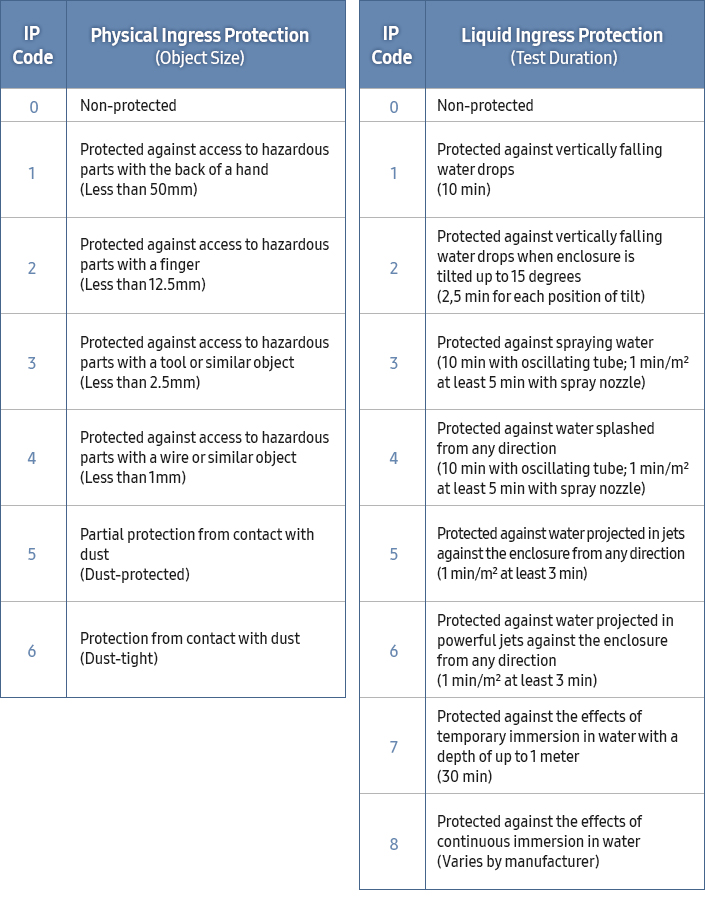Can You Swim with Your Wearable? These Water Resistance Ratings Will Help You Find Out
Samsung India’s recently released wearables, the Gear Sport and Gear Fit2 Pro, are lifestyle companions packed with everyday health and fitness features to help consumers get the most out of their activities, like swimming. In fact, users need not worry about wearing their new Gear device in the pool, the rain or the shower, as both have a water resistance rating of 5 ATM (50 meters).

But what exactly do these numbers mean? And what makes ATM water resistance ratings different from other kinds of evaluation standards, such as IP ratings? Read on to find out.
IP Ratings – Making a Splash in the Mobile Industry
In recent years, as more and more individuals have begun taking their smartphones and wearables to places where just a little water can cause huge problems, demand for water-resistant electronics has skyrocketed. As a result, a number of international standards have been put in place for testing water resistance, including the Ingress Protection (IP) rating established by the International Electrotechnical Commission (IEC).
A device’s IP rating consists of two numbers and is given in the format IPXY (i.e. IP67). X is the rating for physical ingress, or how resistant the device is to penetration by foreign solid objects such as dust, and ranges from 0 to 6. Y, meanwhile, represents the rating for liquid ingress, or how resistant it is to penetration by liquids under various conditions, and ranges from 0 to 8. Below are charts that summarize these protection levels.

SOURCE: IEC 60529 ed.2.2 “Copyright © 2013 IEC Geneva, Switzerland. www.iec.ch”1
The rating number assigned for each category indicates that the device being tested has met the requirements for each previous rating. For example, Samsung’s Gear S3 smartwatch, which has a rating of IP68, has passed the rating requirements for all six physical ingress levels and the first eight liquid ingress levels. In other words, under specific conditions, the Gear S3 can withstand accidental submersion up to 1.5 meters underwater for 30 minutes, as well as contact with harmful dust.

While a fitness band or smartwatch with an IP68 rating can be worn while jogging in the rain or doing the dishes, IP ratings do not take water pressure into account. Therefore, IP ratings are not indicative of a device’s ability to be used during aquatic activities such as swimming. This is where ATM ratings come in.
ATM Ratings – Water Resistance Under Pressure
While many manufacturers tend to follow IP ratings, some independently test their products to determine how much static pressure they can withstand when submerged. These pressure tests are measured in ATMs – which stands for atmospheres – and are converted to water depth to make the measurements easier to comprehend.
One ATM is equivalent to the static pressure exerted by static submersion in 10 meters of water. The higher the ATM rating, the deeper the product can go without being affected, as deeper water exerts more pressure. The basic ATM water-resistance levels are described below.2

Again, these ratings are for static pressure, meaning that if the device is resting still in a test chamber, it can tolerate pressure up to the rated value and will function properly upon its removal. Conversely, any application of dynamic pressure caused by movement of the wearer (such as diving into the water, for example) increases the pressure of water exposure. So, while a 3 ATM-rated fitness band could easily withstand rain, it might be damaged if sprayed with a powerful hose.
With a water resistance rating of 5 ATM, Samsung’s Gear Sport and Gear Fit2 Pro are resistant to pressure at a depth of 50 meters, meaning the devices can not only stand up to the rain, but can also be worn during shallow water activities. This, along with the Speedo On swim tracking app,3 make the two new wearables ideal companions for any swim, whether tackling laps or going for a relaxing dip in the pool.
In summary, not all “water-resistant” devices are created equal. Therefore, it’s important to understand water resistance ratings to ensure your devices meet your needs and are appropriate for your lifestyle.
For more information about Samsung’s Gear Sport and Gear Fit2 Pro, click here.
1 All such extracts are copyright of IEC, Geneva, Switzerland. All rights reserved. Further information on the IEC is available from http://www.iec.ch. IEC has no responsibility for the placement and context in which the extracts and contents are reproduced by the author, nor is IEC in any way responsible for the other content or accuracy therein.
2 ATM ratings are not authorized by the ISO. Listed usage examples are guidelines only. The survivability of a device depends not only on the water depth, but also on the age of the sealing material, previous damage, temperature and additional mechanical stresses, among other variables.
Products > Mobile
For any issues related to customer service, please go to samsung.com/in/support for assistance.
For media inquiries, please contact corpcommindia@samsung.com.
